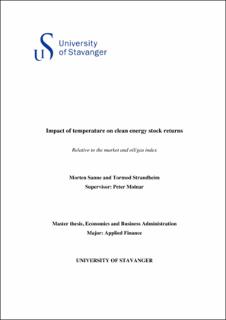| dc.description.abstract | This study examines the effect temperature has on stock returns, and whether clean energy stocks respond differently to temperature than the general stock market. The paper focuses on three different indices; a clean energy index, a market index, and an oil/gas index, with the majority of stocks trading at the New York Stock Exchange (NYSE). Psychological studies suggest that temperature affects people’s mood, in turn leading to behavioural changes. Further on, the feeling of apathy and aggressiveness has been linked to warm and cold temperatures, respectively. With aggressiveness related to increased risk-taking and apathy linked with a reduced appetite for risk, we expect to see a general negative correlation between temperature and stock market returns. With climate change poising a growing threat, it has become a major reason for concern, both globally and locally. Studies on temperature and perceived climate change have shown that temperature anomalies have a significant influence on global warming attitudes. In light of this, we expect sufficiently high and low temperatures to have a positive impact on clean energy returns. After examining and comparing three different US stock indices, we find convincing evidence to support our primary hypotheses. Apathy seemingly dominates aggressiveness when temperatures rise, resulting in generally lower returns. For colder temperatures aggressiveness seem to be the dominating factor, leading to overall greater returns. However, the impact on clean energy returns is positive for both warm and cold temperatures, relative to the market. In addition, clean energy -and oil/gas companies have a completely opposite response pattern to warm weather, with a very positive reaction on clean energy stocks and an equally negative reaction on oil/gas stocks. This suggests that abnormally warm temperatures increase people’s beliefs and awareness of climate change, resulting in excess returns for clean energy stocks. The observed results are statistically significant and robust to alternative tests, both before and after controlling for seasonal effects. | en_US |
